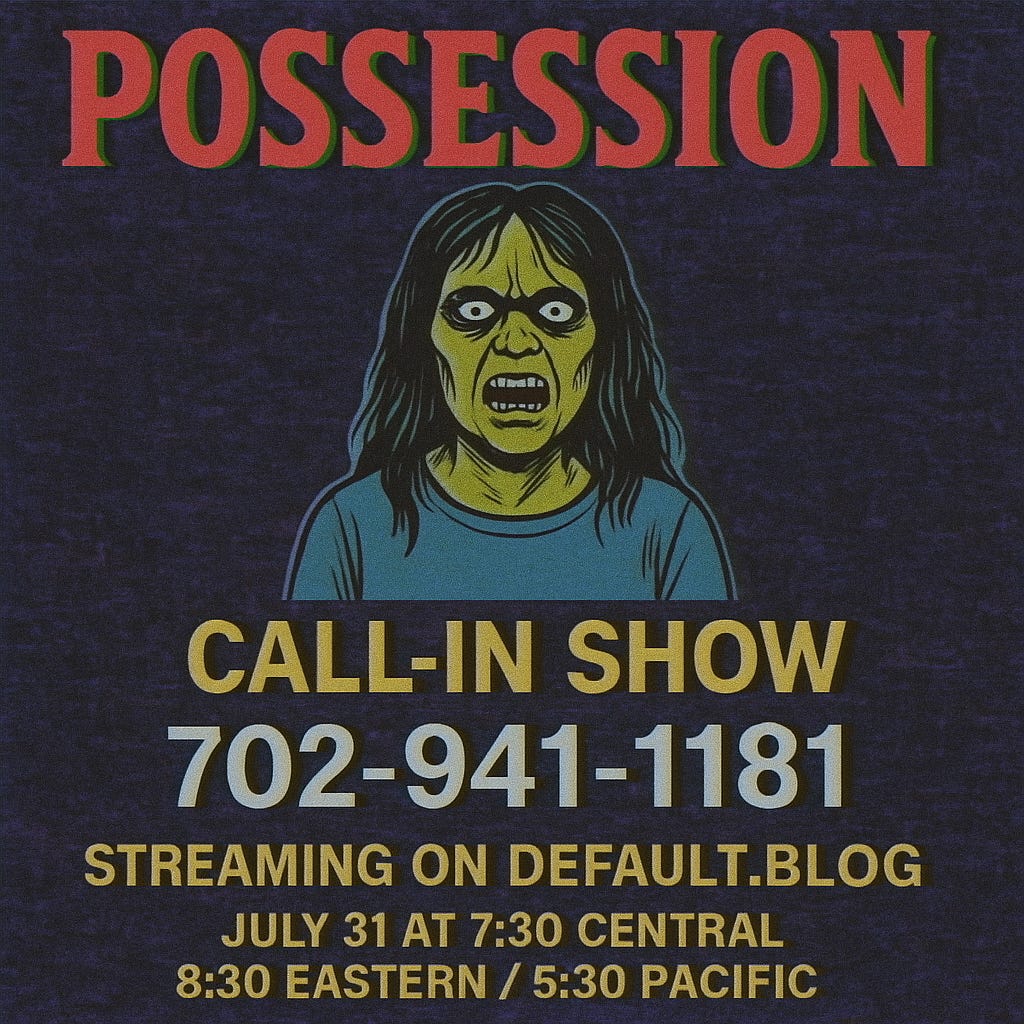You're Never Going to Be Original! (And Neither Am I)
thought digest, 07.31.2025
Good afternoon, Deeists!
First, some housekeeping. Today, you’re going to get TWO emails from me. I am sorry about this but please do not UNSUBSCRIBE…
Ahem.
We’re streaming at 7:30 Central — that’s 8:30 Eastern and 5:30 Pacific. Our call-in topic is POSSESSION. As always, you’re free to interpret that however you like. Literal demonic possession. Possessing a lover. The movie. Stealing shit. Whatever it is, I’m open. Tune in here, on Twitch, X, YouTube, TikTok, or Instagram. You can watch our unedited backlog here.
Drive me up the leaderboard with this month’s SPECIAL OFFER:
YOU WILL LIVE TO SEE PEOPLE STEAL YOUR IDEAS — GET THE FUCK OVER IT
If you’re going to be a writer, you’re going to have to accept that originality is a meaningless metric. Trust me, I hate it too.
This isn’t just because everything has been said before—though it has—but because we’re not playing an originality game. We’re playing a marketing game.
Two recent Substack posts about plagiarism drive this point home. In “No one is stealing your trend stories,” Teddy Brown argues that cultural observations exist in the commons, belonging to no single observer. In the other post, Katie Jgln discovered that Maalvika, Substack’s top new bestseller, had appropriated entire passages from her work—down to specific metaphors and italicized emphases.
These stories reveal the same underlying dynamic, though at different extremes: writers mine identical cultural veins, but only select few will be able to extract value. And it fucking sucks.
As recently as five months ago, there was a clear difference between shaping discourse and commanding audiences—-that is, influence and reach. It’s a distinction that not everyone understands and I know it sounds contradictory, but they’re not the same thing. Being in the writerly “in-crowd” and having a big audience have less overlap than you’d expect. You can straddle both, but not always.
Online, many writers consciously or not, accept smaller readerships in exchange for outsized cultural impact. There’s a cohort of people who set the tone, even if they don’t have the recognizability of say, a big YouTuber or streamer or TikToker. This bargain manifested in tangible ways: NYT profiles nobody reads, invitations to exclusive parties in places like the Hamptons, speaking engagements, a lucrative book deal.
This is model is already a departure from the era of the celebrity journalist—where you’re making over a $1 a word—but it’s more similar to that era than what is emerging now. It can only exist in a world with gatekeeping, which I still believe is important, but that’s another article for another day. At any rate, I’d be lying if I said Substack wasn’t changing the influence/follower power dynamic.
THE TAXONOMY OF BORROWED IDEAS
Success in this new economy depends largely on having the right take and presenting it to the right audiences—which is where plagiarism enters the picture. Let me map out how idea-lifting actually works, because it’s more nuanced than “someone stole my idea”:
The Strategic Readers: Some readers aren’t fans—they’re miners. They extract ideas and reprocess them for different markets. Sometimes they don’t even know that they’re doing it. This happens to every writer after a certain point. If you’re a progressive, your ideas might get repackaged for a conservative audience (or vice versa). If you’re not so well-read but still have good ideas, your stuff might get intellectualized. So on and so forth. It’s not illegal, not quite ethical, but it’s entirely rational in an attention economy. For those of us are less successful, it’s also wildly demoralizing.
The Tweet/TikTok-to-Think-Piece Pipeline: Spot a banger tweet or TikTok, race to transform it into 1,800 words. The winner isn’t the best or most original writer—it’s whoever hits publish first and directs it to the right audience. I’ve watched people build entire careers on this model.
The Zeitgeist: Sometimes we all notice the same thing, as Teddy points out in his piece. Just this month, I read not one, but two pieces about how politics has become a fandom. Neither plagiarized the other and neither plagiarized me, who’s written that piece no fewer than half a dozen times. (FWIW: I didn’t plagiarize Marshall McLuhan, Neil Postman, Douglass Rushkoff, Henry Jenkins, or danah boyd etc., etc., etc!)
It’s just plainly true that politics is entertainment and entertainment properties have fandoms form around them. Everyone—the two writers I just mentioned and myself—are just responding to the same observable reality. The most successful person either got there first or presented it to the right people.The Discourse Lifecycle: Certain topics follow predictable patterns. Take the Gender Wars, a discourse ecosystem I used to be a part of. The cycle goes like this:
Extremist position emerges (“all men are...” / “all women are...”)
Counter-extremist appears with equal and opposite take, sometimes as a rhetorical spear, e.g. Radfem Hitler holds a mirror up to the Manosphere
“Nuanced centrist” shows up to “tell it like it is”
Everyone debates the hits (body count, OnlyFans, whatever)
Topic exhausts itself
The scene peters out
A new generation arrives or participants rebrand (feminist becomes trad, trad becomes radfem) and there’s a changing of the guard
This cyclical nature means that if you’re in political writing or gender writing or any of these take-selling markets, if stick around for long enough, and you’ll see pieces you yourself wrote years ago get recycled as breakthrough thoughts.
“You’re a genius!” they’ll say to someone else. It’s frustrating but you’re not a failure for not sticking with it—this shit gets boring as hell. That said, not only did nobody plagiarize you in this situation, getting mad is like yelling at the tide.
It’s just the nature of the market.
And finally:
Actual, Explicit, Dyed-in-the-Wool Plagiarism: Then there’s the real deal. Paul Skallas (aka Lindyman) literally copy-pasted and earned himself a New York Times profile. Then he got booted from Substack. The audacity was almost admirable, in fact, I complimented him on it (though he did NOT appreciate that). This is actually less common, but still happens.
Which brings me to Maalvika, and what I suspect went down there…
The AI Launderer: The Maalvika situation smells like AI-assisted plagiarism. Feed someone’s article into ChatGPT, ask for a rewrite, maybe shuffle some paragraphs. Boom—”original” content. If you’re gonna pull this shit, please at least read what you prompted!
Maintaining relevance requires producing an insane amount of content on frankly exhausting topics. So why write at all if this is how it’s gonna be? Because validation is addictive and you can make money off it and it feels better than being a wagecuck.
This content treadmill hits especially hard for people who came up in traditional media, though you’ve probably noticed that (or experienced it yourself). There’s a specific kind of psychic damage in going from “writer” to “content creator.” I recently unfollowed this writer whose entire brand became grievance about this. Brother, we get it. He’s not even wrong. But adaptation beats bitterness every time. You’re not going to change the system from the inside and this model isn’t going to fail just because you think if you were born twenty years earlier, you would have been a celebrity journalist for Vanity Fair. Either start a YouTube channel and suck it up, or get over yourself.
I’VE BEEN EXPERIMENTING WITH DOING HEADINGS THIS WAY—WHAT DO YOU THINK?
The writers thriving now aren’t necessarily the most original. They’re the most adaptive. They understand that in our current publishing environment:
Timing is almost everything
Audience is important
Voice (and parasociality!) make or break you
Consistency is mandatory, not a hack that’ll get you noticed
Network effects matter, sorry!
Get used to video, you’re gonna need it
Anyway, there you have it.
“It is what it is,” as they say…
ICYMI—ME AROUND SUBSTACK:
ME AROUND THE WEB:
The Tea ‘Hack’ (Not Actually a Hack): A Complete Timeline for Pirate Wires
The People Who Think They Were Born Into the Wrong Race also for Pirate Wires
Submit missed connections, personals, and advice questions to me directly or on Tellonym. I am also always accepting writing submissions.
DRIVE ME UP THE LEADERBOARD DEEISTS:2
Please LISTEN to my short story : )
based on a REAL 1980s menu







The Maalvika situation reminds me a bit of what happened to James Somerton a while back.
I don’t think we should be super nit picky about people who happen to have the same idea, or somewhere along the line forgot what they read. (It’s a bit unrealistic to require someone to have a perfect log of everything.)
But, I do think it’s wrong when you intentionally try to present someone else’s idea as your own. Part of me wishes the internet had stronger norms around citation (or at least acknowledging the idea is not your own if you think the source is an info hazard) but I know it’s not a realistic expectation. Luckily, egregious plagiarism tells on itself eventually.
This is such a necessary reality check for anyone trying to make it as a writer right now. The taxonomy you've laid out is spot-on - I see all of these patterns playing out constantly, especially the tweet-to-think-piece pipeline and the discourse lifecycle you describe.
What strikes me most is how the shift from influence to reach has fundamentally changed what we're optimizing for. The old model where you could have outsized cultural impact with a smaller, engaged readership feels increasingly quaint. Now it's all about timing, audience targeting, and yes - shameless adaptation of what's already working.
Your point about the Gender Wars cycle is brilliant. You can literally watch these conversations repeat every few years with slightly different players, and whoever happens to be positioned right when the cycle comes around again gets credited as a visionary. It's like intellectual crop rotation.
The AI laundering thing is particularly insidious because it gives people plausible deniability. 'Oh, I just happened to have the same thoughts!' Sure, Jan. But honestly, the amount of content we're all expected to churn out makes some version of this almost inevitable. The treadmill is relentless.
I think you're right that adaptation beats bitterness, but damn if it doesn't sting sometimes. The writers who are thriving aren't necessarily the most insightful - they're the ones who best understand the game being played.